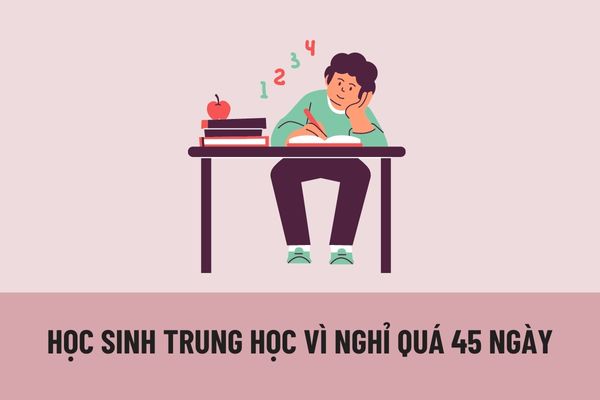Is it permissible to expel high school students for being absent for more than 45 days? What are the conditions for recognizing completion of the high school program?
What are the conditions for recognizing the completion of the secondary education program by students?
Based on the provisions of Article 12 Circular 22/2021/TT-BGDDT, the conditions for recognizing the completion of the secondary education program by students are as follows:
Students who meet all the following conditions are promoted to the next grade or recognized as having completed the lower secondary education program, the upper secondary education program:
- The annual behavioral results (including reassessment results after summer training) are assessed at the Achieved level or higher.- The annual academic results (including reassessment results for subjects) are assessed at the Achieved level or higher.- Absences do not exceed 45 days in a school year (calculated according to the education plan of 01 session/day as specified in the General Education Program, including both excused and unexcused absences, whether continuous or non-continuous).
In the case where students need to undergo summer training, it is conducted according to the provisions of Article 13 Circular 22/2021/TT-BGDDT. If students need to take reassessment exams during the summer, it is conducted according to the provisions of Article 14 Circular 22/2021/TT-BGDDT.
For disabled students: The principal bases the assessment results of disabled students according to the provisions of Article 11 Circular 22/2021/TT-BGDDT to determine whether they should be promoted or recognized as having completed the lower secondary education program, the upper secondary education program for disabled students.

Is it permissible to expel a secondary school student for excessive absences? What are the conditions for recognizing the completion of the secondary education program?
What should the school do when middle school students frequently miss more than 45 days of school?
Based on the provisions of Article 15 Circular 58/2011/TT-BGDDT (supplemented by Clause 7, Article 1 Circular 26/2020/TT-BGDDT), the provisions are as follows:
Promotion or Non-promotion
1. Students who meet all the following conditions are promoted to the next grade:
a) Conduct and academic performance of at least average level;
b) Absences do not exceed 45 days in a school year (whether excused or unexcused, continuous or cumulative).
2. Students who fall into any of the following cases are not promoted:
a) Absences exceeding 45 days in a school year (whether excused or unexcused, continuous or cumulative);
b) Annual academic performance is Poor or both academic performance and conduct are Weak;
c) After reassessment in certain subjects, the average score in subjects assessed by points is below 5.0 or subjects assessed by comments are rated Not Achieved, eventually still failing to reach the average level;
d) Conduct is rated as Weak for the entire year and failing to complete required tasks during summer training thus is still rated Weak in conduct.
3. Promotion considerations for disabled students
Principals shall base on the academic results, educational activities of disabled students to determine their promotion if they study according to the general education program, or base on the results of the implementation of the Individual Education Plan for disabled students who do not meet the general education program to determine their promotion.
According to the above regulations, secondary school students frequently missing more than 45 days will not be promoted.
Is the school allowed to expel a student for frequently missing more than 45 days?
Based on the provisions of Article 38 Circular 32/2020/TT-BGDDT, the provisions are as follows:
Awards and Discipline
1. Students with achievements in studying and training are awarded by teachers, the school, and educational management levels with the following forms:
a) Commendation before the class or the whole school;
b) Awarding student titles according to regulations;
c) Issuance of certificates of merit, merit awards, if they have outstanding achievements or extraordinarly progress in certain fields of study, in emulation movements; achieving results in exams, competitions prescribed and permitted by the Ministry of Education and Training;
d) Other forms of awards.
2. Students with shortcomings in the learning process and training are educated or disciplined in the following forms:
a) Directly reminding, supporting, and assisting students to overcome shortcomings;
b) Reprimanding and informing parents to coordinate and assist students in overcoming shortcomings;
c) Temporarily suspending school attendance for a definite period and implementing other educational measures as prescribed by the Ministry of Education and Training.
The disciplinary forms for secondary school students include:
- Directly reminding, supporting, and assisting students in overcoming shortcomings.- Reprimanding and informing parents to coordinate and assist students in overcoming shortcomings.- Temporarily suspending school attendance for a definite period and implementing other educational measures as prescribed by the Ministry of Education and Training.
It can be seen that expulsion is not a disciplinary measure for secondary school students.
Thus, students frequently missing more than 45 days should not be subjected to expulsion by the school.
LawNet